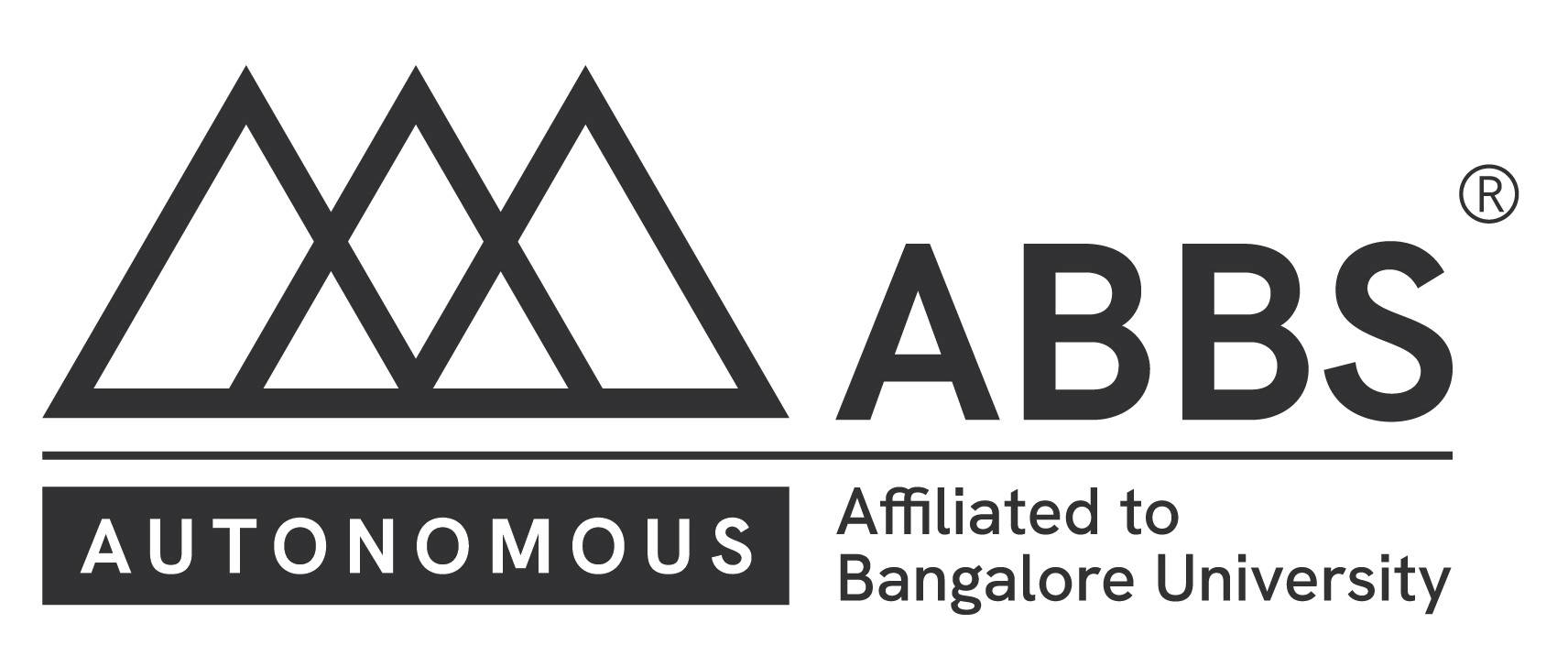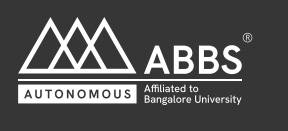(ICRBSNABM’23)
05th- 06th January 2023
Acharya Bangalore B School (ABBS)
Acharya Bangalore B School (ABBS) is one of the premier educational institutions in Bengaluru, Karnataka, run by Samagra Sikshana Smithi Trust. ABBS through its decade-long journey in Management Education has now stood as one of the most sought-after management institutes in India. MBA is the Flagship Program of the B-School. ABBS also offers graduate and postgraduate programs in Science, Commerce, Management, and Arts. The growing importance of ABBS in the educational scenario in Bengaluru is solidified by the fact that it attracts students from across the country and the globe. Its emphasis on quality education and holistic development is proven by its repeat accreditations. ABBS has accreditation from NAAC–‘A’ grade (Second Cycle in 2017). The Management Department of ABBS has international accreditation from IACBE, USA. The MBA Program of the institute has NBA accreditation in the second cycle.
Theme of the Conference
The need to develop sustainable, flexible, and profitable business models is more urgent today than ever before. Business Model Innovation gained a lot of attention and interest, especially in 2020, with the arrival of the coronavirus pandemic, throwing many businesses out of gear. In the COVID world, digital transformation has emerged as a priority for many organizations, putting business models up for accelerated innovation. With customer preferences and demographics changing tremendously, companies are forced to move out of the comfort of traditional business models and push the envelope to offer something more valuable to the consumer. Business Organizations are looking to restructure their business models to stay relevant and show resilience. Of the diverse reasons for this update, one sticks out is ensuring that a real value is delivered to the end consumer. A Successful Business Model offers resilience by adapting to changing market conditions and business needs. The agile business model is here to stay, especially in the hyper-connected world.
Objectives of the Conference
In the current global competitive context, the objective of this Two day’s International Conference on “Redefining Business Strategies: A New Age Business Models” (ICRBSNABM’22) is to provide an international platform for the academicians, researchers, industry participants, business practitioners, and students to share their research findings, knowledge and experiences with the global domain experts.
Sub -Theme of the Conference:
The conference will focus on the contemporary issues, challenges, and emerging trends in this global business environment. The conference will have both conceptual and empirical papers in the following areas:
|
Marketing |
Human Resource Management |
|
Innovations in Marketing |
Strategic HRM |
|
Business to Consumer (B2C) Marketing |
Global HRM – Issues And Challenges |
|
Business to Business (B2B) Marketing |
Cultural Diversity and Human Capital |
|
Technology Marketing |
Organizational Development and Change Management |
|
Product and Brand Management |
Crisis Leadership, Organisational Resiliency |
|
Integrated Marketing Communication Strategies |
Developing Strategic Leadership Capabilities |
|
Customer Relationship Management |
Contemporary Leadership and Management |
|
Marketing Analytics |
Employee Engagement Strategies |
|
Blue Ocean Strategy |
Talent Management: Engaging and Retaining Gen Y |
|
Strategic Management in E-Commerce enterprise |
Industrial Relations and Legal HRM |
|
Digital Marketing |
Contemporary Issues in Industrial Relations |
|
Marketing and Social Media |
Latest Developments in Performance Management |
|
Retailing Issues and Challenges |
Managing Emotional Intelligence in the Workplace |
|
Global Branding Issues |
Emerging Trends in Learning and Development |
|
Approaches and Models of Industry Analysis |
HR Analytics and Strategic Role of Technology in HRD |
|
International Marketing and Consumer Research |
Cross-Cultural Management and Negotiations |
|
Innovation and Entrepreneurship |
Finance & Economics |
|
Managing Disruptive Innovation |
Indian Financial System in New Economic Scenario |
|
Innovation And Product Design |
Financial Markets- Challenges and Opportunities |
|
Technological Innovation Process |
COVID 19 Impact on Economic Activities |
|
Innovation in Management processes |
Digital Innovations in Business and Economy |
|
New Venture Creation & Start-up Management |
Mutual Funds, Insurance, and Other Financial Services |
|
Creativity, Innovation, and Entrepreneurship |
Banking, Micro-financing, and Financial Inclusion |
|
Customer-Centric Strategy through Innovation |
Sustainable Finance and Practices |
|
Social Innovation And Social Entrepreneurship |
Cryptocurrency and Fintech |
|
Green Innovation and Entrepreneurship |
Financial Literacy & Behavioral Finance |
|
Entrepreneurship Training And Development |
Innovative Solutions for Financial Security |
|
Entrepreneurship and MSMEs |
Looking beyond Profits: Redefining Business Boundaries |
|
Technology Entrepreneurship |
Global Laundering |
|
Surrogate Entrepreneurship |
Corporate Restructuring |
|
Cyber Entrepreneurship |
Intellectual Capital |
|
Strategy for Building Entrepreneurial Communities |
Financial Engineering |
|
Role of Government in Promoting Entrepreneurship |
Behavioral Economics, Welfare Economics, Development Economics |
|
Business Analytics and Information Technology Services |
Operations Management |
|
Big Data Applications, Challenges, and Opportunities |
Fostering Innovations in Operations Management |
|
Artificial Intelligence, Data Science & Machine Learning |
Optimization Techniques |
|
Data-driven Analytics and Business Management |
Flexibility Inclusive And Sustainable Industrialization |
|
Green Projects and Green Technology |
Business Continuity, Planning & Professional Practices |
|
Industry 4.0 Technologies |
Contactless Manufacturing, Storage, Handling, Delivery |
|
Applying New ICT tools for business |
Supply Chain Risk Management |
|
Cloud Computing and Algorithms |
Services Operations Management |
|
Big Data Analytics and Algorithms |
Sustainable Operations Management |
|
Applications of Blockchain Technology |
Supply Chain Management in Digital Era |
|
Applications of AI for better business sustainability |
New Technology Absorption |
|
Augmented Reality (AR) and Virtual Reality (VR) |
Project Management |
|
Applications of Meta-Heuristics |
Robotics Process Automation |
|
Enterprise Resource Planning (ERP) |
Software Quality Engineering |
|
Software Quality Management |
Lean Six Sigma |
|
Education Technologies and E-Learning |
Total Productive Maintenance |
|
Role of ICT in Education |
Total Quality Management (TQM) |
|
Blended Learning |
Zero Defect /Zero Effect |
|
Technological Challenges in Implementing NEP 2020 |
Facility Location Decision |
|
Learning Management System |
Circular Economy |
|
Innovative Teaching Methods and Practices |
Business Process Re-Engineering (BPR) |
|
Role of Technology in Pedagogy & Curriculum Development |
Logistics and Warehouse Management |
|
Emerging Issues and Challenges in E-Learning |
Emerging Practices in Tracking and Tracing |
Who can participate?
Students, Academicians, Research Scholars, Entrepreneurs, Industry Participants, and Business Practitioners across different domains and disciplines from all over the world.
Paper Submission – Guidelines for Submitting Abstracts and Full Papers
|
Abstract |
Not more than 300 words excluding the Title /Cover page |
|
Full paper |
Not more than 5000 words excluding Title /Cover page and references |
|
Font Type |
Times New Roman |
|
Font size |
12 |
|
Spacing |
1.5 |
|
Style |
APA style of referencing |
Correct Name, Designation, and e-mail ID of the authors and affiliating organization need to be mentioned in the abstract and full paper. A declaration should be provided from the corresponding author along with the paper stating Abstracts that the work is an original one and does not violate Copyright.
Guidelines for Submission of Manuscript
- Authors are requested to submit the abstract/Full paper in MS-word format at [email protected]
- The manuscript should be in MS-word format. The manuscript must be 1.5 line spaced, with 1-inch margins with “Times New Roman, font size 12, black.
- On the First Page of the paper (Cover page), please provide full names (First, middle and last names) and full addresses (Institute’s address along with designation and correspondence address) along with the email address of the author(s). The author’s name or affiliations should not appear anywhere else in the body of the manuscript to facilitate the blind peer-review process.
- The actual paper should commence from the second page. The manuscript contains the title followed by the abstract, keywords, and the main paper. The paper should have an introduction, literature review, objectives, research gaps, methodology, limitations/scope for future work, and conclusion.
- The abstract, followed by relevant keywords should not be more than 300 words and should adequately describe the work and highlight its significance. The abstract should only include text. Avoid the use of abbreviations and references in the abstract.
- The manuscript should not be more than 5000 words including tables, figures, and an appendix given at the end. Headings and subheadings must be short and not numbered. The primary heading should be in the capitalized form (upper case), and boldface. The sub-headings should be in title-case capitalization (first letter of each word in the capital) and in bold. The table should be numbered consecutively. The title of the table should be placed above the table. The source should be indicated at the bottom.
- Figures/ diagrams/ graphs should be numbered consecutively. Wherever necessary, the source should be indicated at the bottom. The figures should also be given relevant titles. Figures, diagrams, and pictures should have good quality images preferably in JPEG Format.
- References should be included at the end of the paper and arranged in alphabetical order. The references must follow the style guide of the American Psychological Association (APA).
- A declaration should be provided from the corresponding author along with the paper stating Abstracts that the work is an original one and does not violate Copyright.
Registration Details:
- Authors can start submitting the abstracts and complete the registration process in order to avail the early bird registration benefits. All the authors have to do the registration individually to present the paper at the international conference and receive the conference certificate.
- *Absentia Option is available for all the individual participants provided wherein, such author needs to complete the registration process with a nominal cost of ₹500 at the earliest. Only registered authors would be receiving the conference certificate.
Conference Participation Fee:
|
Category |
Early Bird Registration Before September 30, 2022 |
Normal Registration Before Decmber 30, 2022 |
|
Student Participant (Both UG and PG) |
₹1000 |
₹1500 |
|
Research Scholar |
₹1000 |
₹1500 |
|
Academicians |
₹1500 |
₹2000 |
|
Industry Practitioner |
₹2000 |
₹2500 |
|
International Participants (Listener – Virtual Mode) |
$50 |
$75 |
|
International Participants (Presenter – Virtual Mode) |
$50 |
$75 |
*The fee is inclusive of the Conference kit, Lunch & Snacks, Conference Proceedings, and Certification.
Registration Fees Payment Procedure
Payments can be made Through Electronic Fund Transfer (EFT) using either of the following account numbers. Overseas participants are requested to make payment only through EFT vide INR (Indian Rupees). (Both Indian/ International Participants)
- Bank Name: South Indian Bank., Branch: Indiranagar, Location: Bangalore
- S/B Account Number: 0399053000015083
- IFSC CODE: SIBL0000399
Participants Scan QR Code Option is available in the Conference Registration Form
Publication Opportunities:
The conference offers 3 publication opportunities.
- All the papers accepted for the conference, post completion of the due registration process, will be published as Conference Proceedings (Soft Copy) with ISBN: No in it.
- Selected few research papers would be considered for publishing in the Institute’s refereed journal – AMBER ABBS Management Business and Entrepreneurship Review indexed in J-Gate, i-scholar after a double-blind review process with free of cost.
- If Authors would like to publish their research articles in the UGC Care listed or Scopus / WoS Journals, then they need to contact the conference convener.
- High-Quality Papers will be given the opportunity to get published in ABDC Category Journals.
Conference Organizing Committee:
|
Chief Patrons : |
Dr.B.Vijay Pal Reddy Chairman, Acharya Bangalore B School, Bengaluru, Karnataka, India. |
|
Smt. B.Poornima Reddy Managing Director, Acharya Bangalore B School, Bengaluru, Karnataka, India. |
|
|
Shri. Ajitesh Basani, Executive Director, Acharya Bangalore B School, Bengaluru, Karnataka, India. |
|
|
Advisory Committee : |
Dr. H.R.Venkatesha, Director, Acharya Bangalore B School, Bengaluru, Karnataka, India. |
|
Dr.D.M.Mahishi, Director-lQAC, Acharya Bangalore B School, Bengaluru, Karnataka, India. |
|
|
Dr. Madhumita Chatterji, Director, ABBS School of Management, Bengaluru, Karnataka, India. |
|
|
Dr. Vijaya Bhaskar, Principal, Acharya Bangalore B School, Bengaluru, Karnataka, India. |
|
|
Conference Convener : |
Dr.V.P.Sriram Professor, Department of MBA, Acharya Bangalore B School, Bengaluru, Karnataka, India. |
Important Dates
|
International Conference Important Dates |
Deadlines |
|
Abstract Submission Starts |
05th July 2022 |
|
Notification of Acceptance-Abstract |
10th August 2022 |
|
Full Paper Submission |
30th November 2022 |
|
Last Date for Registration |
30th December 2022 |
|
Conference Date |
05th – 06th January 2023 |
For Further Details Contact and Queries
Dr.V.P.Sriram,
Conference Convener/ Professor,
Department of MBA
Mobile: No: +91-9823535445 / E-mail: [email protected]
Webpage: https://abbs.edu.in
Dr.H.S.Shalini,
Conference Secretary/ Associate Professor,
Department of MBA
Mobile: No: +91-6361615843
E-mail: [email protected]
Dr.Arul Senthil B,
Conference Secretary/ Assistant Professor,
Department of MBA
Mobile: No: +91-9445406577
E-mail: [email protected]
Webpage: https://abbs.edu.in




